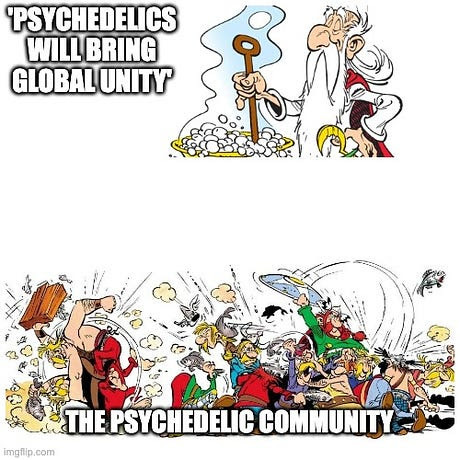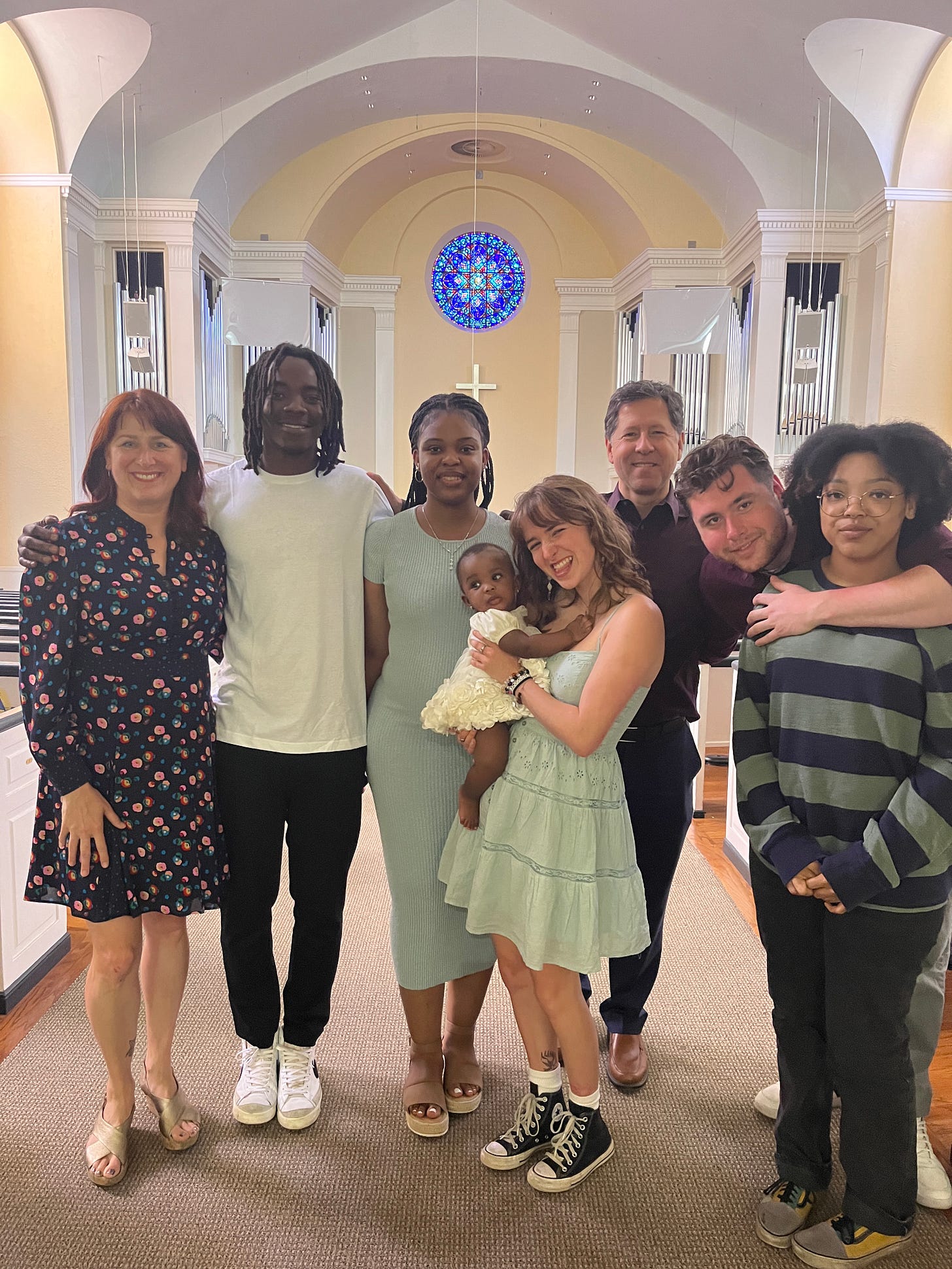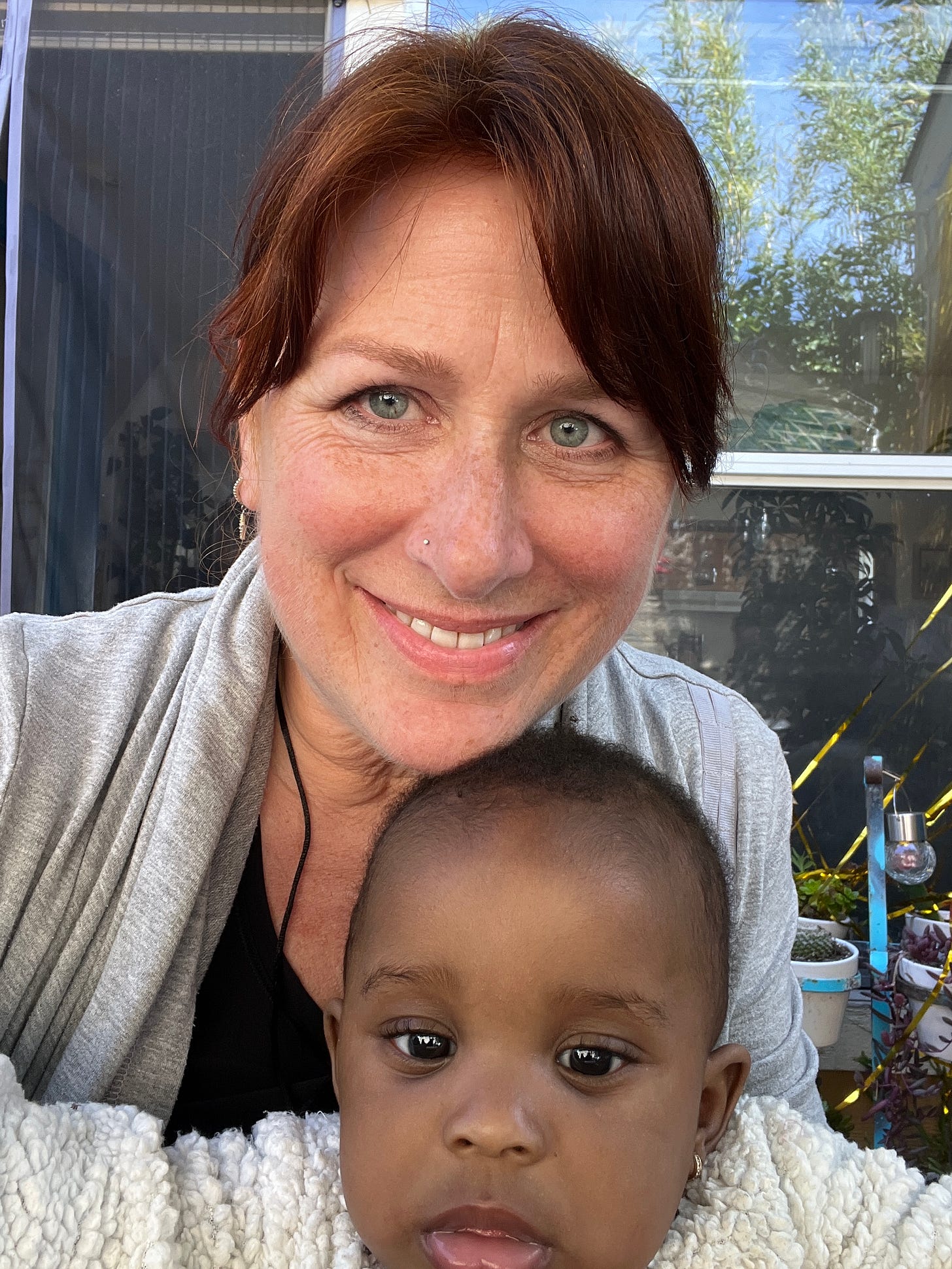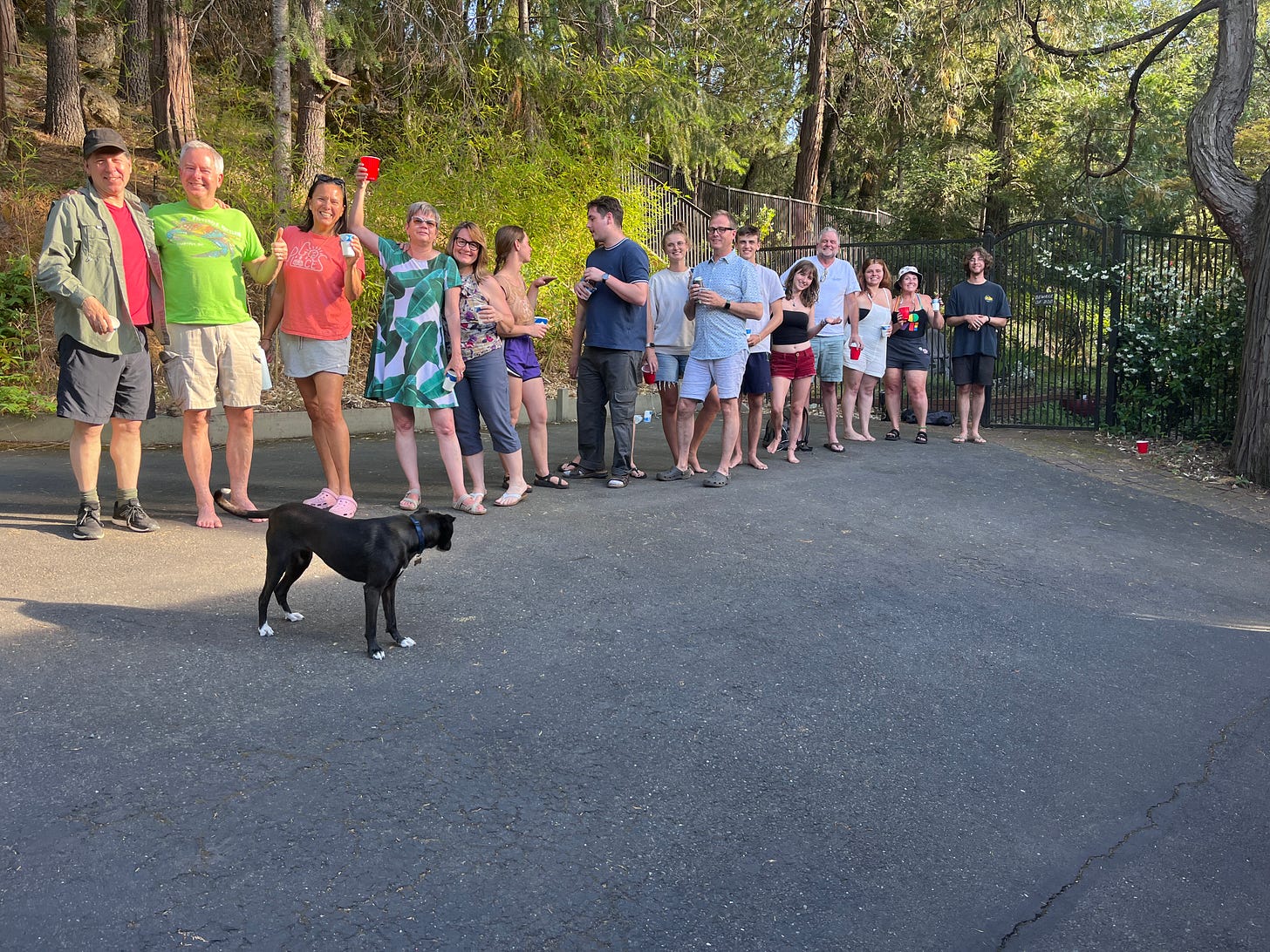Expectancy Bias
or, Stirring the Poop Chutes
I haven’t written in a while. Hiiiiii!
June was a whirlwind within a tornado within a hurricane. We had houseguests for 27 out of 29 days, and together had a hero’s journey through approximately 11.2 Peak Life Moments, including daughter Carmen’s graduation from high school, the baptism of my first grandbaby, and a mini-reunion of 18 dear friends for our belated 25th wedding anniversary Jubilee! Pics down below for the curious.
Now Carmen has flown the nest, working on the maintenance crew of our church camp 3,000 miles away and engaging in such wholesome activities as “stirring the poop chutes,” aka making sure the compost toilets…compost. She’ll come back for a couple of weeks in September before moving to the Mexican border to be a freshman at UC San Diego. Son Rafe is doing reconnaissance to move to the Oregon border as a transfer student at Cal Poly Humboldt this August. Our house is getting emptier, quieter and cleaner! It’s devastatingly sad and very exciting all at the same time.
I thought I would mope forever, deprived of marauding bands of teenagers, their wanton laughter and high-decibel antics, the rumblings from downstairs of late-night viewings of Pitch Perfect III or Borat, waking to half-empty chip bags and generalized stickiness. Not to mention all the real, durable joy of having older teens and young adult children at home: physical affection, stimulating political debates about Gaza and whether Biden should step down, a chance to be the prefrontal cortex for my kids for a little longer as they navigate relationships, their own mercurial brains, and endless paperwork (I told them our open secret, y’all. That adulting is 2% about emotional maturity and 98% about filling out forms).
I love my kids. A lot. Especially since, as I joked recently, they have finally started loading the dishwasher the right way. And I did mope when Carmen left. Mostly, I lay around feeling really sad and eating out of all those half-empty chip bags.
If I’m honest, it wasn’t just moping. It was deep grief. Some of it I began to feel well before the kids left. It’s been creeping up on me for the last 2 years that this chapter of our life together was coming to and end. Frankly, it feels like a completely unnecessary divorce. Or like a severed limb. Unnatural, occasionally excruciatingly painful, a deep ache where something (or someone) should be that isn’t there any more.
It doesn’t help to know that it is deeply right and GOOD that the kids are doing what they are supposed to do, to keep on becoming themselves. My excitement for them lives in lockstep with the grief, but it doesn’t assuage it. I wouldn’t keep them home any more than I would bind their feet or put them in a cage. But that doesn’t mean I have to like the leaving.
Yeah yeah, it’s also true that here in the US we have a slavish devotion to the fiction of individualism. In other cultures adult children live at home till they are married (if they marry), and beyond. I myself have dreamed of having a family compound–someday, may it be so. But every culture also has its mythology about young people leaving the tribe to test their mettle. We can’t become all that we need to be in the shadow of our parents, under the thumb of their (my) anxieties and neuroses, enabled and enfeebled by our fluttering overfunctioning on their behalf. Even young people who need more help or more time–because of the way their brains or bodies work, or because of the high cost of living–need to test the strength of their wings.
And even as I believe in radical interdependence and mutual aid, there’s something to having a life stage where you “take everything you have and be poor” for a while (to misquote Jesus). A necessary season of providing more fully for yourself, especially when your nest has been a little socioeconomically comfortable, as our kids’ has. A little semi-voluntary suffering brings perspective, forces choices, forges values.
So, I’m sad these days. Journaling is helping, dumping raw grief into my diary. So is spending time with other empty-nesting friends, and having the occasional cry with my husband Peter.
But I’m also happy. Little tickles of motivation and energy and desire have started to assert themselves now that my emotional field and my calendar are a little clearer. I’ve made appointments for a couple of distressing body issues. I went to the library and got a huge pile of novels. I am ready to start my psychedelic apprenticeship in earnest, getting experience in supporting medicine sessions, doing more self-experimentation, and engaging in what I call “Holy Spirit Traffic Direction,” connecting people to resources.
I feel the sap rising in me–my kids are starting their next big thing, but so am I! And I have the shiny certificate to show for it!
Last month I led a few Zooms for local churches to talk about what I think clergy and congregations need to know about the emerging psychedelic movement. A sweet friend who has video editing skills made it pretty and you can watch it here if you want to understand this world a little better.
My own psychedelic emergence felt perfectly timed with the culture. Suddenly psychedelics are mushrooming up everywhere in pop culture (I mean, when TARGET is selling a mushroom tee shirt…you know you have arrived).
Later this summer, the FDA was predicted to reschedule (a big step closer to legalization) MDMA for the psychedelic-assisted treatment of PTSD, and rumor had it that psilocybin would not be far behind.
Then things took a turn in early June when an FDA advisory panel voted 9-1 against it. The final decision won’t be made until early August, and it could still happen. But there is suddenly a lot of consternation in the psychedelic community.
[If you’re curious to get into the weeds on the legalization skirmishes, I recommend reading Jules Evans’ Substack Ecstatic Integration, from which I pilfered the cartoon above. He’s a proponent of psychedelics but has a strong bent toward ethics and safety]
Some folks are happy that legalization might be delayed. They worry it will lead to psychedelics becoming commodified and warped into a for-profit industry, elbowing out and even legally imperilling legacy religious/spiritual practitioners and communities, particularly indigenous communities.
Others are upset because as long as these molecules remain illegal, many people suffering from depression, anxiety, PTSD and a host of other ills won’t get access to the support they need unless they have the means and the willingness to go underground.
I certainly understand the caution inherent in legalizing molecules that can cause such a dramatic shift in consciousness, and put people very vulnerable to harm into the hands of bad actors, or simply naive or unskilled facilitators.
But some of the arguments made by the FDA panel were truly specious. For one: they were worried about therapy as an adjunct to psychedelics. What form of therapy would practitioners use? How could it be standardized, to measure efficacy of treatment more scientifically? Well…therapy is NOT scientific. So maybe don’t worry about it? 22 vets are dying by suicide every day. Ask their families if they care what therapeutic model could have been used alongside the medicine: internal family systems versus cognitive behavioral therapy, to give their loved one the tools to stay alive.
Another argument by the advisory panel that made even less sense was the one against expectancy bias. In essence, expectancy bias is when a person in a medical trial expects to be helped by the medicine. Did they get better because the medicine legitimately helped them, or was it a some kind of psychosomatic effect?
This infuriates me. Really, FDA? You’re going to delay or destroy the hope of a new PTSD treatment because people actually believe it might make them better?
Expectancy bias is nothing more than a fancy phrase for: HOPE. Some people come to psychedelics after years of trying everything else. It is both spiritual and medical malpractice to try to take that hope away from them.
I think of Thessalonians, some of the first words written down in what would become the New Testament.
“Brothers and sisters and siblings, we do not want you to be uninformed about those who sleep in death, so that you do not grieve like the rest of humankind, who have no hope.”
Expectancy bias is nothing more than a fancy phrase for HOPE.
Paul is talking about resurrection, the fact that Christians believe in life after death. Resurrection comes not just after physical death (for those who believe in an afterlife) but smack in the middle of human living. When the obstinate grief begins to fade. When you put down the bottle. Take the first step toward repairing a cutoff. Find love again. Go on the meds. Have a breakthrough in treatment.
Resurrections are all around us. But first, you have to die. To your ego. To the reality you’d constructed. To your arguments against getting help. To the idolatries that stood in for God (and yes, even our children can become our idols…or the idea of a political savior).
What doesn’t die in the midst of all of these deaths is hope. It is there, a seed, perhaps dormant to every sense when pain or numbness rule the day. Lying there under all that shit, waiting for its moment. Protected by a shell until the conditions are right for sprouting.
We are in the shit right now. Amen, Beloved?
I think of Carmen, 3,000 miles away, stirring the poop chutes in the compost toilet at our church camp once a week. We have fallen into some shit, but maybe God is giving the poop chutes a little stir every now and then. Activating the aerobic bacteria to break the mess down and turn it into life-giving fertilizer, something that will grow a garden, a field, a whole earth full of good things. Someday. It will take time.
But expect it.
Much love,
Molly <3
Bonus: Some photos from our various extravaganzas!
Carmen’s epic high school graduation with not one but TWO amazing grammas + Tia Carmen!
The baptism of Djunica, the sweetest smartest most gorgeous grandbaby I have (ok the only grandbaby so far), brought to you by The Creator and Djuni’s exceptional parents, our son Junior and his partner Djune visiting from Boston:
And finally, the Jubilee 25th wedding anniversary fête at Folkenvale! I’m behind the camera, about to make everybody do icebreakers, which they loved. No cap.











Excellent… Fortitudinous… Compassionate… Vulnerable and Honest. Thanks for allowing me in. You are a blessing. - Dwight Lee Wolter
Appreciate all of this! The skeptic part of my brain wonders about the dark side of expectancy bias -- when someone comes to psychedelics with a lot of hope after years of things not working and then the psychedelics happen to not work for them. Could there be a lot of harm in this -- to think you've finally found the holy grail because of the hype, to anticipate relief, and then for it to not work? What could mitigate this, and what can help people keep feeling hopeful if they fall into this category? Thinking of this in terms of psychedelics and theologically/spiritually. (And I'm on the side of hope.. am genuinely curious what to do with this potential snag.)